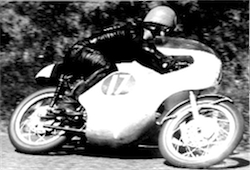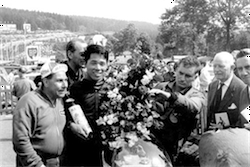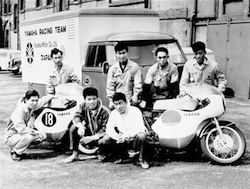Column vol.06
View our column profiling Yamaha's 50 years of involvement in racing. Vol.6 Unrelenting pursuit and finally the first GP victory

The RD56 powered Fumio Ito to Yamaha's first podium finish with a 2nd at the 1963 Isle of Man TT
In the three seasons from 1963, the Yamaha team won 15 of the 26 races they contested in the 250cc class. As the machine that powered Yamaha to two straight Rider and Manufacturer titles in these years, the Yamaha RD56 won its place in the annals of GP road racing as one of the great machines of the 1960s.

1963 was a breakthrough season for Yamaha. Fumio Ito won the Yamaha team's first GP victory at Spa-Francorchamp
These great achievements proved the strength of the 2-stroke engine as the power unit Yamaha had developed since its beginnings. At the same time, they brought great pride and Kando* not only to the development staff but to all of the company's employees. Furthermore, the strength of the Yamaha 2-strokes brought the era of 4-stroke dominance to end. The RD56 in particular can be credited with making the 2-stroke engine the new standard of the World GP arena. It had been no easy feat, however. It took Yamaha five years of factory machine development before winning its first GP race. In the meantime, Honda had stormed in and won double championships in the 125cc and 250cc classes in 1961 and 1962. For the Yamaha staff involved in the machine development from the start of the GP challenge and had ventured to Europe as team staff themselves, these had been five years of unending struggle against adversity. When their efforts finally bore fruit and they were able to watch their RD56 and their rider Fumio Ito battle against Honda's champion, J. Redman, and top riders like T. Robb at the 1st All Japan Championship, the Yamaha developers were ecstatic. The following year they had the excitement of watching Ito win the 250cc class at Daytona. In the Open Class as well, Don Vesco outran the Norton factory machine with his Yamaha. Seeing this, expectations grew rapidly for Yamaha success in the World GP. In the fifth round of that 1963 World GP series, the Belgian GP, the stage was set for Yamaha's first victory. The circuit for this round at Spa-Francorchamp was a high-speed course that favored the RD56. What'smore, Ito was fresh from two 2nd-place finishes at the Isle of Man TT and the Dutch GP. The whole team was determined to make this their big race.

The Yamaha factory team that made history on the 1963 World GP circuit
Once practice started, however, they found that the engine was sputtering and failing to reach top speed on the home straight. The course's ups and downs and vibration were causing erratic performance of the carburetor float and resulting in inconsistency in the richness of the air-fuel mixture. The engineers hustled to find a solution. Changing the settings alone was not enough. As a last resort they decided to modify the carburetor by aligning two float chambers front and rear to stabilize the fuel supply. But time had run out and they had no time to test the modification before the race. It was a do-or-die last-ditch attempt. "We said, let's give it a try and take our chances. That is one moment in my long racing career that I will never forget," recalls one of the riders at the time, Yoshikazu Sunako. Their gamble paid off, as Ito raced to the win, setting a new course record of 4 min. 27.7 sec. in the process. Sunako finished 2nd behind Ito to top off Yamaha'sfirst GP victory with a one-two finish. Later, the Yamaha engineer who served as team manager at the time told about the experience.
"I wasn't on the scene at the moment but I have been in similar situations numerous times. If you put your heart into the job 100%, you will always be rewarded in the end. Time and again I have come to feel that an engine is a living entity. If you get lazy for a moment or let yourself be distracted by something else, things just don't go as you hoped. You come to feel like a parent raising a child, with all the care and patience it takes."
*Kando is a Japanese word for the simultaneous feeling of deep satisfaction and intense excitement that people experience when they encounter something of exceptional value.


